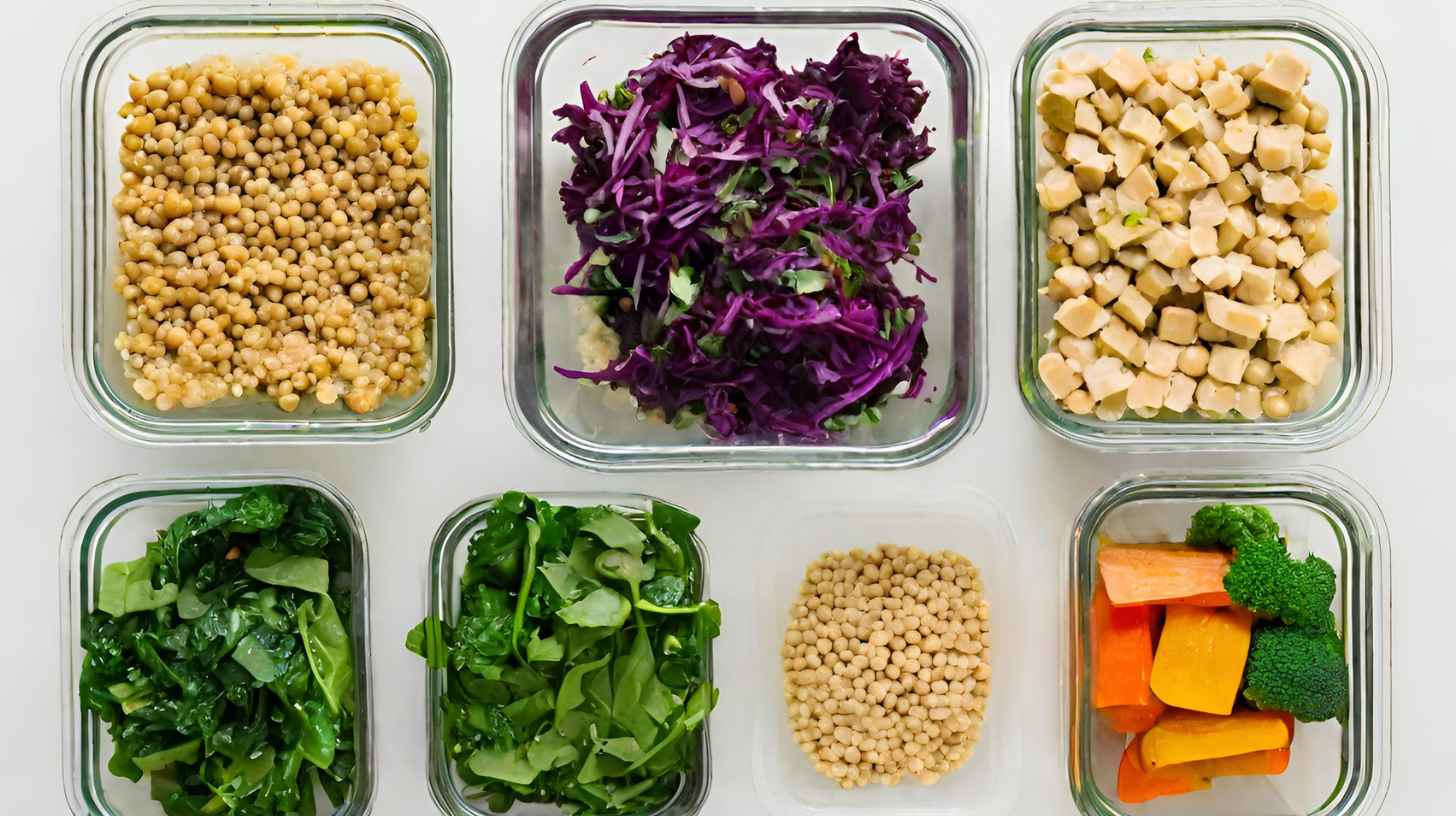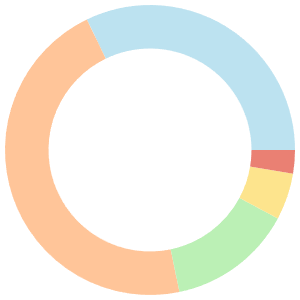Vegan meal plan for anemia
Combat anemia with our 14-day vegan meal plan tailored to boost iron levels. Featuring a variety of iron-rich and nutrient-dense recipes, this plan aims to provide nourishment during treatment. Explore a variety of flavorful options that prioritize the unique dietary needs of individuals facing anemia on a vegan diet.




Meal plan grocery list
- Lentils
- Chickpeas
- Spinach
- Kale
- Swiss chard
- Broccoli
- Tofu
- Tempeh
- Quinoa
- Brown rice
- Almonds
- Chia seeds
- Flaxseeds
- Blueberries
- Strawberries
- Tomatoes
- Oranges
- Kiwi
- Fortified cereals
- Vegan protein powder
- Unsweetened vegan yogurt
- Water

Article Reviewed
Meal plan overview
Combat anemia with our 14-day vegan meal plan tailored to boost iron levels. Featuring a variety of iron-rich and nutrient-dense vegan recipes, this plan aims to provide nourishment during treatment. Explore a variety of flavorful vegan options that prioritize the unique dietary needs of individuals facing anemia.

Foods to eat
- Leafy Greens: Include iron-rich leafy greens such as spinach, kale, and Swiss chard in salads, smoothies, or stir-fries.
- Lentils and Legumes: Opt for lentils, chickpeas, and other legumes as excellent sources of plant-based iron and protein.
- Fortified Cereals: Choose iron-fortified cereals to boost your iron intake, especially for breakfast.
- Nuts and Seeds: Snack on almonds, pumpkin seeds, and sunflower seeds for a dose of iron and essential nutrients.
- Dried Fruits: Incorporate dried fruits like apricots, raisins, and prunes into meals or enjoy them as snacks.
- Tofu and Tempeh: Include tofu and tempeh in stir-fries, salads, or as meat substitutes for added iron.
- Quinoa: Cook quinoa and use it as a base for salads, bowls, or side dishes to increase iron intake.
- Citrus Fruits: Pair iron-rich foods with vitamin C-rich fruits like oranges and strawberries to enhance iron absorption.
- Dark Chocolate: Enjoy dark chocolate in moderation, as it contains iron and can be a delightful treat.
- Iron-Rich Smoothies: Blend iron-rich ingredients with fruits and plant-based milk for a nutritious and delicious smoothie.
✅ Tip
Focus on iron-rich foods such as beans, lentils, spinach, and fortified cereals to help boost iron levels and combat anemia.
Foods not to eat
- Calcium-Rich Foods with Meals: Avoid consuming calcium-rich foods with iron-rich meals, as calcium may inhibit iron absorption.
- Excessive Caffeine: Minimize caffeine intake, especially during meals, as it may interfere with iron absorption.
- Unhealthy Fats: Limit intake of fried and processed foods, as they may contribute to inflammation and nutrient absorption issues.
- High-Fiber Foods with Iron Supplements: Separate high-fiber foods from iron supplements to ensure optimal absorption.
- Iron Blockers: Be cautious with foods containing substances that can inhibit iron absorption, such as tea and coffee.
- Processed Vegan Snacks: Choose whole, nutrient-dense snacks over highly processed vegan snacks with little nutritional value.
- Iron Supplements without Guidance: Consult a healthcare professional before taking iron supplements to avoid potential complications.
- Alcohol: Minimize alcohol consumption, as it can impact nutrient absorption and overall health.
- Overly Restrictive Diets: Avoid overly restrictive diets that may limit the variety of nutrient-rich foods needed for optimal health.
- Sugar-Sweetened Beverages: Reduce intake of sugary drinks, as excessive sugar can negatively affect overall health.
Main benefits
The Vegan meal plan for anemia addresses iron deficiency by including a variety of iron-rich foods like spinach and legumes, coupled with vitamin C-rich foods to enhance iron absorption.

Fat
Carbs
Protein
Fiber
Other
How to budget on this meal plan
Lentils and chickpeas are great iron sources and can be bought in bulk. Dark leafy greens like spinach, kale, and Swiss chard are iron-rich and can be more affordable when bought frozen. Tofu and tempeh are good protein sources and can be more economical in bulk. Vitamin C-rich fruits like oranges and kiwi help with iron absorption and can be bought in season for better prices.
Download the grocery list FREE
- Add & remove items
- Sort items by store aisles
- Share the list with others

Extra tips ✨
Any healthy snack ideas?
Iron-rich vegan snacks ideal for combating anemia:
- Fortified cereal with soy milk
- Spinach and kale salad with lemon dressing
- Lentil soup
- Roasted pumpkin seeds
- Quinoa stuffed bell peppers
- Dried apricots and almonds
- Whole wheat toast with peanut butter
What should I drink on this meal plan?
In managing vegan anemia, iron absorption is key. Vitamin C-rich drinks like orange juice can aid iron absorption from meals. Herbal teas like nettle or dandelion can be beneficial. Green smoothies with iron-rich veggies (like spinach) are great. And of course, staying hydrated with water is essential.
How to get even more nutrients?
Addressing anemia in a vegan diet means ensuring adequate intake of iron and vitamins crucial for iron absorption. Include iron-rich foods like lentils, chickpeas, and spinach. Pair these with vitamin C-rich foods like bell peppers and oranges to enhance iron absorption. Also, incorporate foods high in folic acid, such as asparagus and beets, and consider a vitamin B12 supplement, as B12 is vital for red blood cell production and is mostly found in animal products.
Meal plan suggestions
Vegan Meal Plan for Anemia
This vegan meal plan is tailored to provide essential nutrients to help manage anemia.
Day 1
- Breakfast: Smoothie with spinach, kale, berries, chia seeds, and fortified cereal
- Lunch: Chickpea and quinoa salad with tomatoes, almonds, and lemon-tahini dressing
- Dinner: Tofu stir-fry with broccoli, bell peppers, and brown rice
- Snack: Handful of strawberries and almonds
Calories: 2200 Fat: 80g Carbs: 250g Protein: 90g
Day 2
- Breakfast: Chia seed pudding made with almond milk and topped with sliced kiwi
- Lunch: Lentil soup with spinach, carrots, and whole-grain bread
- Dinner: Tempeh curry with kale, tomatoes, and quinoa
- Snack: Vegan yogurt with flaxseeds
Calories: 2150 Fat: 75g Carbs: 240g Protein: 88g
Day 3
- Breakfast: Oatmeal topped with berries, almonds, and a splash of orange juice
- Lunch: Spinach and chickpea salad with avocado, tomatoes, and balsamic vinaigrette
- Dinner: Stuffed bell peppers with quinoa, black beans, and tomatoes
- Snack: Orange slices and almonds
Calories: 2100 Fat: 72g Carbs: 235g Protein: 85g
Day 4
- Breakfast: Whole-grain toast with almond butter and sliced strawberries
- Lunch: Brown rice bowl with tofu, broccoli, and sesame seeds
- Dinner: Lentil and vegetable stew with Swiss chard and whole-grain couscous
- Snack: Vegan protein shake
Calories: 2250 Fat: 78g Carbs: 250g Protein: 90g
Day 5
- Breakfast: Smoothie bowl with kale, berries, chia seeds, and a sprinkle of flaxseeds
- Lunch: Quinoa salad with roasted chickpeas, spinach, and lemon-tahini dressing
- Dinner: Tofu and vegetable stir-fry with brown rice
- Snack: Vegan yogurt with mixed berries
Calories: 2200 Fat: 80g Carbs: 245g Protein: 88g
These values are approximate and can vary slightly based on specific portion sizes and preparation methods.
Download the FREE grocery list for this meal plan
Get grocery list
Want to learn more?
⚠️ Keep in Mind
As with any dietary change, it is recommended to consult with a healthcare professional or registered dietitian before changing your dietary habits.




